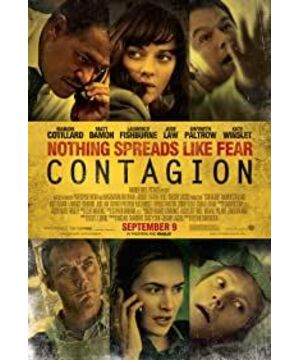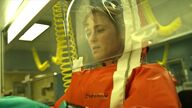The friendliness and danger of shaking hands, determined by the virus
As soon as the film came up, it was a coughing sound and quickly entered the situation. The new virus in the film begins in Hong Kong, and the yellow-green hue unique to Hong Kong films makes the disease even more terrifying at this time, making it depressing and frightening.
The disease in this film, like a zombie virus, quickly died after being infected; and the transmission was extremely strong, quickly spread from Hong Kong to the world, and countless people suffered. Through the end of the film, it can be seen that it is a similar swine flu virus that bats brought to pigs.
Although it is a movie, it looks like a news feature film. It records the entire process of the virus spread with a timeline, and presents the different performances of patients, doctors, governments, media, and citizens in all aspects, which also leads to no part of it being portrayed. Deep, and from a cinematic point of view, it's rambling.
However, compared to the scientific nature of documentaries and the profundity of high-quality films, what "Infectious Diseases" can bring to people is a relatively straightforward and real sense of substitution.
The film mentions thinking about the virus. The virus first infects friends and relatives. As said in "Blood Plague", the terrible thing about the virus is that when we express our love, it brings disaster. The plot about the original meaning of handshake in this film also shows the same truth: handshake originated from expressing no danger, but this point, the virus does not know.
The film shows the social chaos in a major epidemic, especially the act of making a fortune through panic: Forsythia, which is claimed to be able to "cure" the disease, has not been scientifically proven, but it has been snapped up by the public.
In addition, the film presents reflections on vaccines.
First of all, whether it is this "Infectious Disease" or the Korean movie "Influenza", they all end with the development of a vaccine. But the reality is that too many deadly viruses have no vaccine yet.
Secondly, even if scientists can develop a vaccine, this film gives a very naked display: the vaccine is limited and there are too many people, who will fight first? So, other people will feel unfair, it's a social problem.
Third, even if there is a vaccine, even if everyone can get it, the reporter's speech is thought-provoking, who can know what the side effects of the vaccine will be, and what will be faced in a year, ten years later. It's a medical issue, it could also involve ethical issues, philosophical issues...
The most touching scene in the film is that after the medical scientist developed the vaccine, he decided not to experiment on monkeys, but to inject himself.
In the film, I said something related before, "The monkeys are so pitiful, they have to be sent into space, and they have to be injected with the whole body virus." Human beings experiment with other creatures for their own survival. How should such behavior be judged? The continuous occurrence of global infectious diseases, is the virus invading human beings, or is it a counterattack against human violations?
The most three-dimensional character created by the film is the reporter played by Jude Law.
It's a movie with big names, except for thinking about viruses, there's nothing else.
View more about Contagion reviews










